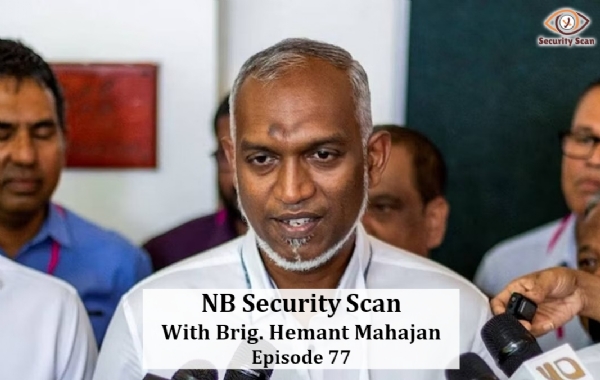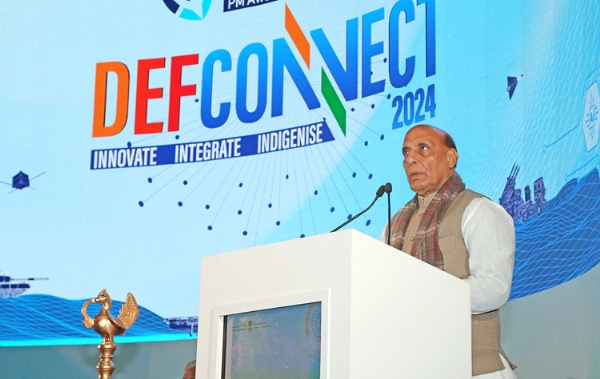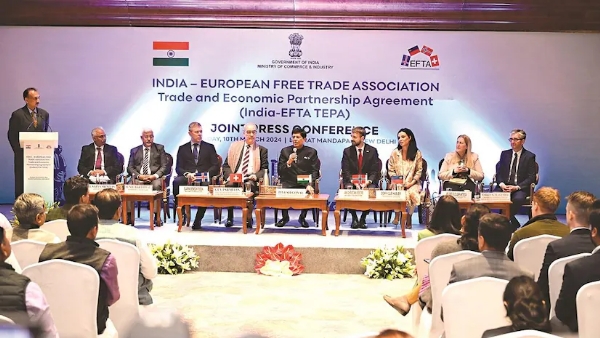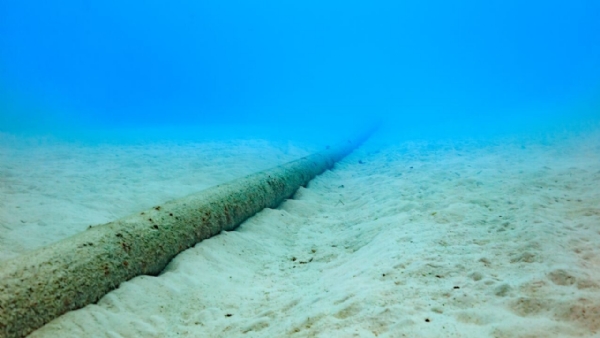#SecurityScan 77: China's increased defence budget, Maldives-China defence agreement & much more
“The cyber threat posed by the Chinese government is massive.” That was FBI Director Christopher Wray, speaking at a recent security conference in Munich.
Total Views |
This article based on national security is a summary of important events that have taken place in last one week affecting India's national security

#COUNTERING CHINESE MULTI DOMAIN, GREYZONE, HIGH BREED WARFARE
China increases defence budget by 7.2% to accelerate military modernisation; Here's how India's preparedness holds up
China has announced a significant 7.2% increase in its defence budget, surpassing $230 billion, which is more than three times India's military expenditure. This increase comes despite China's economic slowdown and refusal to de-escalate tensions with India along the Line of Actual Control (LAC). China aims to modernize its two-million-strong armed forces to deter US interference, especially regarding Taiwan. This includes strengthening conventional military and nuclear forces and strategic moves in the Indian Ocean Region (IOR), such as a military assistance pact with the Maldives.
China warns that increasing Indian troops at border won't ease tensions
China criticizes India's troop addition, stating it doesn't ease tensions. Indian soldiers now safeguard a China-India segment, straining relations. A unified force protects a 532 km border section spanning Tibet, Uttarakhand, and Himachal Pradesh, amidst the India-China border dispute.
China, uses access to its massive economy as a way to coerce states that go against the regime’s wishes.
Economic coercion has become a significant element of China's foreign policy, serving as a tool to penalize countries perceived as challenging its national interests or the legitimacy of the Chinese Communist Party (CCP). An illustrative example occurred in 2021 when China responded to the announcement of a Taiwanese Representative Office in Lithuania by suspending permits for Lithuanian food imports. Similarly, in 2020, China retaliated against Canberra's calls for a World Health Organization-led inquiry into the origins of the coronavirus by halting imports of Australian beef, barley, and other products. This followed restrictions on coal imports in response to Australia's exclusion of Huawei from its domestic 5G infrastructure.
Rather than resorting to formal economic sanctions, which China has long criticized as tools of Western hegemony, the country imposes costs on targeted nations through informal methods. For instance, to justify an import ban on foreign agricultural products, China often alleges the presence of pests or other ecological threats. These measures provide China with a level of plausible deniability, making it challenging for targeted countries to pursue legal action, while also adhering to its principled opposition to formal sanctions.
Despite the evident harm caused by these punitive measures, they have proven relatively ineffective in persuading targeted countries to align their behavior with China's interests.
Chinese Hackers Infiltrating America’s Critical Infrastructure
“The cyber threat posed by the Chinese government is massive.” That was FBI Director Christopher Wray, speaking at a recent security conference in Munich. With its 3,300 utilities and sprawling web of 5.5 million miles of distribution lines, the United States is particularly vulnerable to cyber incursions. It’s imperative for the U.S. to implement robust measures to defend against the rising threat of cyber weapons and update the almost decade-old energy sector plan.
Philippines to push back against China if maritime interests ignored, Marcos says
President Ferdinand Marcos Jr of the Philippines announced that the country will collaborate with China in discussions on the South China Sea dispute, but will firmly defend its sovereignty and maritime rights. He emphasized the importance of working with Southeast Asian nations and China to establish a code of conduct in the South China Sea based on international law. Despite this, Marcos reiterated that the Philippines will not concede any territory to a foreign power.
Maldives-China defence agreement to obtain non-lethal weapons and training, says President Muizzu
The Maldives has signed a military assistance agreement with China, marking a significant step in their relationship. President Mohamed Muizzu emphasized that this agreement, providing free "non-lethal" military equipment and training, will strengthen the Maldives' independence and autonomy. This is the first such agreement between the Maldives and China, previously known for economic support. The agreement includes training and non-lethal military equipment like tear gas and pepper spray. Muizzu's meeting with Chinese officials underscores the growing military ties between the two nations, amid a backdrop of shifting geopolitical dynamics.
China Outpacing U.S. Defense Industrial Base
China’s defense industrial base is operating on a wartime footing, while the U.S. defense industrial base is largely operating on a peacetime footing. Overall, the U.S. defense industrial ecosystem lacks the capacity, responsiveness, flexibility, and surge capability to meet the U.S. military’s production and warfighting needs. Unless there are urgent changes, the United States risks weakening deterrence and undermining its warfighting capabilities. China is heavily investing in munitions and acquiring high-end weapons systems and equipment five to six times faster than the United States. China is also the world’s largest shipbuilder and has a shipbuilding capacity that is roughly 230 times larger than the United States. One of China’s large shipyards, such as Jiangnan Shipyard, has more capacity than all U.S. shipyards combined.
China’s Semiconductor Industry Advances despite U.S. Export Controls
Paul Triolo stresses that the Chinese semiconductor industry is pursuing a multipart strategy to respond to U.S. choke points. China prefers connectivity with global industry but is focusing resources on technologies already under pressure or likely to face restrictions. As with any complex industry, and the semiconductor industry arguably has the world’s most complex technology and geographically dispersed supply chains, the devil will always be in the details.
Countering External & Internal Security Challenges
DefConnect 2024: Rajnath Singh launches ADITI scheme, allocates ₹750 crore to promote innovation in Defence Technologies

The Ministry of Defence (MoD) announces ₹750 crore corpus under ADITI scheme to boost innovation in defence tech. The scheme aims to develop 30 critical technologies by 2025-26 and bridge gaps in Armed Forces' capabilities. Start-ups can receive up to ₹25 crore for research. Defence Minister Rajnath Singh emphasizes self-reliance in defence production and transforming India into a knowledge society. The scheme marks an expansion of iDEX with iDEX Prime offering increased assistance. ADITI underscores the government's commitment to innovation and self-reliance in defence.
Swedish defence major Saab starts construction of new Carl-Gustaf factory in India
Saab to produce Carl-Gustaf M4 weapon systems in Haryana, India starting next year. The company received approval for 100% FDI for the project in October. Construction of the 3.6-acre facility in Jhajjar has begun. This is Saab's first manufacturing unit for Carl-Gustaf M4 outside Sweden. The facility will employ around 100 people and will fully meet 'Make in India' requirements. Saab plans to start production next year, partnering with Indian suppliers. The Carl-Gustaf system has been in service with the Indian Army since 1976.
Exercise Dharma Guardian: Indian, Japanese troops exhibit skills in joint training
Indian and Japanese troops displayed their skills on the obstacle course during Exercise Dharma Guardian 2024, highlighting the seamless cooperation between the Indian Army and Japan Ground Self-Defense Force (JGSDF). The joint exercise aims to enhance interoperability and mutual understanding, deepening defense ties between the two nations. Lieutenant General Togashi Yuichi, Commanding General, Eastern Army, JGSDF, visited the exercise site to observe progress and boost morale. The exercise, emphasizing counter-terrorism and disaster response, strengthens regional stability and peace in the Indo-Pacific.
India, France hold dialogue on disarmament, non-proliferation of weapons
India and France recently conducted a bilateral dialogue focusing on disarmament and non-proliferation, particularly regarding nuclear, chemical, and biological weapons. Discussions also covered space security and conventional weapons, including the use of AI in the military and lethal autonomous weapon systems. India emphasized its commitment to universal nuclear disarmament and its responsible nuclear doctrine, which includes maintaining a credible minimum deterrence and a no-first-use posture. The conference reflects India's proactive engagement in global disarmament efforts.
Rajnath Singh to witnesses twin aircraft carrier operations on 1st day of naval commanders' conclave
Defence Minister Rajnath Singh and top Indian Navy commanders reviewed maritime security challenges during a conference onboard one of the Navy's aircraft carriers in the Arabian Sea. Discussions included China's military presence in the Indian Ocean and the targeting of cargo vessels by Houthi militants. The conference focused on enhancing tri-service synergy and readiness in defence of India's national interests.
India cannot afford to remain dependent on defence imports: Rajnath Singh
India's Defence Minister, Rajnath Singh, has stressed the need for India to reduce its dependency on imported military hardware in order to maintain strategic autonomy. Singh highlighted the Modi government's focus on boosting domestic manufacturing and stated that the annual volume of domestic defence production has surpassed Rs 1 lakh crore, compared to around Rs 44,000 crore in 2014.
Navy commissions strategically important base INS Jatayu in Lakshadweep Islands
The Indian Navy commissioned INS Jatayu at Minicoy island, enhancing its operational capabilities in the strategically important Lakshadweep islands. The new base will support anti-piracy and anti-narcotics operations. The naming of INS Jatayu recognizes the spirit of service before self.
Women Commandos: Catalysts for change, guardians of peace in India's red corridor
The Danteshwari Fighters, the first all-woman anti-Maoist commando unit in Bastar, has evolved from an experiment to a formidable force, with two members recently awarded promotions for their gallantry. These 97-strong volunteers are willing to risk their lives to protect their comrades and communities. Similarly, in Maharashtra's Gadchiroli district, 11 women officers are stationed at a critical outpost, ready to combat Maoist insurgents. Both units, composed of passionate and dedicated women, are making significant strides in the fight against Maoist violence.
JCO kidnapped in Manipur, fourth such incident since conflict began
A Junior Commissioned Officer (JCO) of the Army, Konsam Kheda Singh, was kidnapped from his home in Manipur's Thoubal district by unknown individuals, marking the fourth such incident since the conflict in Manipur began. The reason for the abduction is not yet known, but it is suspected to be related to extortion. Security agencies have initiated a coordinated search operation to rescue the JCO, conducting checks on vehicles along National Highway 102.
Big gain for IAF: Govt clears next-gen fighter prototypes and development
The government has approved the development and prototype production of next-generation fighters for the air force, aiming to bolster the domestic manufacturing ecosystem and enhance the armed forces' combat capabilities. The Cabinet Committee on Security (CCS) greenlit the estimated Rs 15,000 crore proposal, advancing the project to the prototype production stage. The Advanced Multirole Combat Aircraft (AMCA), a fifth-generation fighter jet, is slated to take flight by 2028, featuring cutting-edge technologies like stealth capabilities, AI integration, long-range targeting, and compatibility with unmanned systems.
ECONOMIC WAR-
EFTA has committed to investing $100 billion in India over the next 15 years as part of the free trade pact
India has officially inked a free trade agreement with the European Free Trade Association (EFTA), comprising Iceland, Liechtenstein, Norway, and Switzerland. The signing ceremony took place in the presence of Union Commerce & Industry Minister Piyush Goyal, who highlighted the significance of the agreement. Goyal announced that EFTA has committed to investing $100 billion in India over the next 15 years as part of the free trade pact.
Describing the occasion as momentous, Goyal emphasized that the Trade and Economic Partnership Agreement with EFTA symbolizes the culmination of nearly 15 years of dedicated work and effort. Despite structural differences in various aspects, he expressed confidence in the complementarities between the economies of India and EFTA, foreseeing a mutually beneficial scenario for all nations involved.

Goyal, who co-chaired a meeting on the India-EFTA trade deal in New Delhi, discussed the comprehensive nature of the agreement. Negotiations for the Trade and Economic Partnership Agreement (TEPA) between India and EFTA began in January 2008, aiming to strengthen economic ties. The agreement covers a wide range of areas, including trade in goods, rules of origin, intellectual property rights (IPRs), trade in services, investment promotion, cooperation, government procurement, technical barriers to trade, and trade facilitation.
Highlighting EFTA's global reach, it was mentioned that EFTA already boasts 29 free trade agreements (FTAs) with 40 countries, including Canada, Chile, China, Mexico, and Korea. The four member countries of EFTA— Iceland, Liechtenstein, Norway, and Switzerland—remain committed to fostering free trade and economic integration with their international partners.
ENERGY SECURITY-
Open access solar capacity addition at record 3.2 GW in 2023:
In 2023, India witnessed a remarkable surge in open access solar capacity, with a record-breaking addition of 3.2 gigawatts, marking a 6.66% increase from the previous year. The growth was attributed to various factors, including the reduced cost of solar modules, as revealed in a report. Open access solar entails a setup where a power producer establishes a solar power plant to deliver eco-friendly energy directly to consumers. This significant increase in capacity represents the highest ever recorded in a calendar year.
The cumulative installed solar capacity in the open access segment reached 12.2 gigawatts by December 2023, according to the 'Mercom India Solar Open Access Market Report.' This segment stands out as a bright spot in India's solar market, enticing commercial enterprises and industrial units to transition to solar and other clean energy sources. The report emphasizes the undeniable cost savings potential for businesses, especially with the ongoing decline in solar costs juxtaposed with the rising retail electricity prices. The outlook for this market segment remains highly promising, with anticipated robust growth in 2024 owing to a robust pipeline of projects.
Karnataka maintained its position as the leading state in cumulative installations, contributing 33.1% to the country's overall installations, followed by Maharashtra (13.5%) and Tamil Nadu (11.4%). As of the end of 2023, India had 13.9 gigawatts of projects in various stages of development and the pre-construction phase, underlining the nation's commitment to further expanding its solar energy infrastructure.
News In Brief
Nari Shakti: Indian Army to launch 2 sports companies for girls
The Indian Army is establishing two Army Girls Sports Companies (AGSC) at Army Marksmanship Unit, Mhow and Army Sports Institute, Pune. The AGSCs will train young girls in shooting, archery, athletics, boxing, and weightlifting, providing them with formal education and opportunities for recruitment as non-commissioned officers.
India-Japan to give momentum to defence & investment ties
Jaishankar exhorts Japan to explore investment opportunities including in infra keeping with India’s pace.
World At War: Ukraine War,Hamas War-Lessons or India
The New Cold War: China Takes on Europe
For decades, China fooled the world into believing it was merely another nation looking to embrace economic partnerships and fuel a rising standard of living. While China’s predatory electric vehicle practices are relatively new, China has undermined free societies for years. Free societies around the world, especially those in Europe, must expose the threats posed by the Chinese Communist Party and then move decisively to counter them.
Red Sea Cable Damage Reveals Soft Underbelly of Global Economy
Indian Navy Chief of Naval Staff Admiral R Hari Kumar has stated that Houthis are targeting merchant ships belonging to Israel, the US, or the UK in the Red Sea with drones and missiles, causing a "not very good" situation. The Indian Navy is providing protection primarily to India-flagged ships and other vessels seeking assistance.

Recent damage to three undersea cables in the Red Sea highlights that there are no easy solutions for protecting critical undersea infrastructure. Governments and companies can take steps to improve resilience and enhance maritime awareness.The damage to the cables in the Red Sea demonstrate the vulnerability of vital undersea infrastructure. The difficulty of defending such vast networks and deterring ambiguous attackers means this threat is here to stay. While there are no easy solutions for protecting this soft underbelly of the global economy, public authorities and private companies can take practical steps to improve resilience and enhance maritime awareness. New technology and improved public-private cooperation can help governments, in the words of the U.S. Navy’s project PROTEUS, “collaboratively discover and investigate suspicious and illegal maritime activity throughout the world in ways never before possible AND THEN PUNISH THE GUILTY..”
The Role of the Space Domain in the Russia-Ukraine War: The Impact of Converging Space and AI Technologies
The ongoing conflict in Ukraine, stemming from Russia's aggressive invasion in February 2022, has evolved into a protracted battle marked by substantial casualties and a relentless pursuit of technological advantages. Amidst the rapid advancements in artificial intelligence (AI) and drone technologies, the significance of outer space has become increasingly pronounced. Space operations now play a crucial role in supporting Ukraine's resistance efforts against the invading Russian forces.
Furthermore, space capabilities serve as real-time documentation tools for the conflict, transforming space into a domain where both state and non-state actors, such as private companies and NGOs, actively influence the dynamics and outcomes of the conflict. This trend is underscored by the growing convergence of space technology with AI, aligning with a broader global effort to digitize the command, control, and execution of multi-domain operations.
While this convergence was underway before the conflict, the invasion of Ukraine has provided an opportunity to test emerging technological concepts and tactics that leverage the synergy of space and AI technologies. Simultaneously, the increasing dependence on interconnected space-based systems and infrastructure has introduced new vulnerabilities that adversaries may exploit to disrupt, coerce, or launch attacks. This interconnectedness poses a risk of the conflict extending into orbit or across borders, affecting national security.
In light of these developments, this article scrutinizes the role of the space domain in the Russia-Ukraine war, examining how space has influenced the conflict and delving into the combined use of space technology and AI. The analysis covers the direct contributions of satellite communications (SATCOM), positioning, navigation, and timing (PNT), as well as Earth observation (EO) services.
Ukraine and the Debacle of Russian Soft Power
The conflict in Ukraine has underscored Russia's inability to pursue its foreign policy objectives solely through soft power channels, revealing significant shortcomings in its ability to attract and persuade. Particularly, Russia's soft power approach in Ukraine, centered on the concept of the 'Russian world' (Russkiy Mir), failed to sway Kyiv towards Moscow's alignment through peaceful means.
Concurrently, the European Union's soft power initiatives, advocating for a 'Greater Europe' and promoting Ukrainian 'Europeanness' grounded in liberal-democratic values and economic advancement, curtailed the influence of Russia's soft power endeavors in Ukraine. Unlike genuine attraction, Russian soft power in Ukraine was more akin to propaganda, serving to justify expansionist agendas and blurring the lines with hard power dynamics.
Following the 2022 invasion, in the occupied territories, Moscow's influence relied heavily on coercion, serving as a supplement to hard power tactics through a fusion of smart and sharp power strategies. A comparative analysis of Russian and EU soft power dynamics in Ukraine underscores the latter's generally greater persuasive impact, compelling Moscow to resort to military intervention.
--


